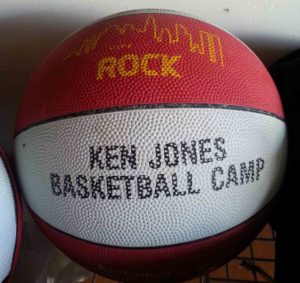 The first principle of my blog is “Creating Ecosystems of Success”. I originally published this series on the Examiner back in 2014. As a teen I dreamt of being a basketball player just like a lot of kids – a dream for which one must have lots of ability, drive, and luck to achieve. My experience turned out to be quite the adventure, and I didn’t formally play basketball beyond high school. The lessons I learned there however, not all of them happy and pleasant, helped me as I progressed into adulthood and into my Science, Technology, Engineering and Mathematics (STEM) career. As mentioned when I began reposting this series, I’m working on an ambitious writing project chronicling my early basketball journey in Western New York.
The first principle of my blog is “Creating Ecosystems of Success”. I originally published this series on the Examiner back in 2014. As a teen I dreamt of being a basketball player just like a lot of kids – a dream for which one must have lots of ability, drive, and luck to achieve. My experience turned out to be quite the adventure, and I didn’t formally play basketball beyond high school. The lessons I learned there however, not all of them happy and pleasant, helped me as I progressed into adulthood and into my Science, Technology, Engineering and Mathematics (STEM) career. As mentioned when I began reposting this series, I’m working on an ambitious writing project chronicling my early basketball journey in Western New York.
Initially I thought that I would simply republish the original series and let it go, but I’ve decided to add onto it as I continue working on my book project and ideas keep coming to me. Heading into the summer months this particular follow up installment will discuss what I learned from the three years I attended basketball camp. See if you the reader can pick up on the universal themes which transcend the great game of basketball. A video about Coach Jones is embedded at the end of this essay.
* * *
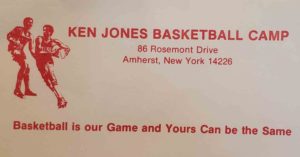 “Basketball is our game and yours can be the same,” was the signature quote of the Ken Jones Basketball Camp – the camp run by Dr. Kenneth Leon Jones, my first high school basketball coach. He told us students more times than I can remember, “I’m a student of the game!” He ate, slept and breathed the great game of basketball. Our basketball program at Hutch-Tech High School in Buffalo, NY was an extension of him and was unique in our league, the “Yale Cup”, during that sliver of time he coached there. He taught us the structure and fundamentals of the game which at that time were the hallmarks of only the area suburban and private schools. To learn some more about what the Yale Cup was like, see parts one and two of my interview with Buffalo basketball legend Jason Rowe.
“Basketball is our game and yours can be the same,” was the signature quote of the Ken Jones Basketball Camp – the camp run by Dr. Kenneth Leon Jones, my first high school basketball coach. He told us students more times than I can remember, “I’m a student of the game!” He ate, slept and breathed the great game of basketball. Our basketball program at Hutch-Tech High School in Buffalo, NY was an extension of him and was unique in our league, the “Yale Cup”, during that sliver of time he coached there. He taught us the structure and fundamentals of the game which at that time were the hallmarks of only the area suburban and private schools. To learn some more about what the Yale Cup was like, see parts one and two of my interview with Buffalo basketball legend Jason Rowe.
What was also unique about our program at Hutch-Tech was that our coach ran his own basketball camp – the first and only one I’d ever attend. I first heard about the Ken Jones Basketball Camp as a freshman. Towards the end of the 1990-91 school year, a highly successful season for Hutch-Tech’s basketball program, Coach Jones posted fliers for the camp on the bulletin board near the coaches’ offices. I knew very few fundamentals of basketball as most of my play consisted of games of “Twenty-One”, also known as “Rochester”, and ‘pickup’ games on Buffalo’s playgrounds and at the William-Emslie YMCA. I thought attending the camp would not only teach me more about the game, but it would also give me an ‘in’ going into tryouts the next year – something it may have in fact done.
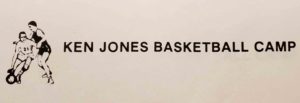 I’ll point out here that my perception of attending the camp as an ‘in’ to get on the Varsity team was a flawed way of thinking. There were several peers who attended the camp and didn’t make the team during those years. For any prospective players or parents reading this, it’s very important for kids with aspirations of playing sports to understand that spots on their school’s roster should be, and must be, earned. Spots on the roster should be awarded based on skills and preparation – not some form of favoritism or partiality – both of which do happen in the real world at workplaces later in life.
I’ll point out here that my perception of attending the camp as an ‘in’ to get on the Varsity team was a flawed way of thinking. There were several peers who attended the camp and didn’t make the team during those years. For any prospective players or parents reading this, it’s very important for kids with aspirations of playing sports to understand that spots on their school’s roster should be, and must be, earned. Spots on the roster should be awarded based on skills and preparation – not some form of favoritism or partiality – both of which do happen in the real world at workplaces later in life.
I was blessed that my mother and father were able to come up with the $300 to $400 fee to attend the Ken Jones Basketball Camp, as not all of my peers could afford to go. Keep in mind that I went three of my four years in high school – again a blessing. Also keep in mind that there were several local camps in and around the city of Buffalo which I didn’t know much about; which in hindsight, I also wish I had attended. Later in life I learned that no matter what your craft is, learning from multiple teachers only makes you stronger and more formidable. Each year the Buffalo News actually advertised all of the area camps, and neither I, nor anyone in my immediate family ecosystem at the time, knew to look for them.
At this point I’ll distinguish between the two types of camps and if I’ve misspoken here, please do leave a comment below this blog post. According to what I’ve learned, there were two types of basketball camps; ‘Teaching’ camps which were designed to impart the fundamentals of the game, and also what I’ll call ‘All-Star’ camps – showcases for the nation’s top talent. These included the: Nike, Adidas, Reebok, and ABCD camps. These camps drew your future Division I and NBA talent. The documentary Hoop Dreams shows a snippet of the Nike Camp in the early 1990s where in that particular year, players like Chris Webber, Jalen Rose, Juwan Howard, and Alan Henderson attended. They were scouted by high-level college coaches like P.J. Carlissimo, Mike Kryzewski, John Chaney, Kevin O’Neil and others.
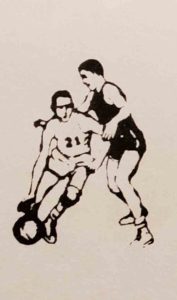 The Ken Jones Basketball Camp was a ‘teaching’ camp. In the early 1990s it was held at Hamilton College in north-central New York State. It drew kids from all over the state – some from the Buffalo area, and many from the Rochester area where Coach Jones used to coach before moving to Buffalo. There were also kids from the middle of the state and the Hudson River Valley. That was true for the coaches on staff too. Coach Jones had an entire lineup of coaches he’d either coached with, coached against, or in many cases had simply befriended along the way. In a way they were like a group of ‘Mob Bosses’ like in the movie Casino. Instead of organized crime though, they were all passionate about basketball. You could hear and feel it in the workshops they taught in addition to how they coached us.
The Ken Jones Basketball Camp was a ‘teaching’ camp. In the early 1990s it was held at Hamilton College in north-central New York State. It drew kids from all over the state – some from the Buffalo area, and many from the Rochester area where Coach Jones used to coach before moving to Buffalo. There were also kids from the middle of the state and the Hudson River Valley. That was true for the coaches on staff too. Coach Jones had an entire lineup of coaches he’d either coached with, coached against, or in many cases had simply befriended along the way. In a way they were like a group of ‘Mob Bosses’ like in the movie Casino. Instead of organized crime though, they were all passionate about basketball. You could hear and feel it in the workshops they taught in addition to how they coached us.
“It’s a season of basketball in a session,” was one of the other signature quote from the camp’s brochure and it was true. It was one week packed with: workshops, drills, and competition. I’d never seen anything like it before. Towards the end of the camp there was a ‘playoff’ for each age group and an All-Star game for the camp’s best players. It was literally like a basketball boot camp. We had to be up at 6-7 am for calisthenics and stretching, and then breakfast to start our day full of games and drills/workshops. We were also supposed to be in bed at a certain hour each night. As promised, our muscles and joints were aching by Tuesday and Wednesday.
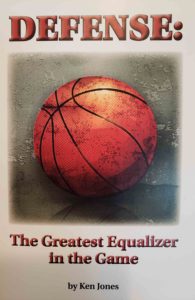 It was a very ‘organized’ style of basketball they taught us there – very different than the ‘street-style’ we played in Buffalo which involved mostly, “going up strong to the ‘hole’,” and usually watching your teammates dominate the ball on offense while everyone else stood around watching – ‘isolation’ basketball. As I was going into the camp looking to become a much better offensive player, I was very much surprised by the amount of time we spent on defensive principles and fundamentals.
It was a very ‘organized’ style of basketball they taught us there – very different than the ‘street-style’ we played in Buffalo which involved mostly, “going up strong to the ‘hole’,” and usually watching your teammates dominate the ball on offense while everyone else stood around watching – ‘isolation’ basketball. As I was going into the camp looking to become a much better offensive player, I was very much surprised by the amount of time we spent on defensive principles and fundamentals.
I also noticed that some of the other kids my age were much more developed than I was in terms of their offensive skill sets and their overall ‘basketball-IQs’ – their basic knowledge of the game allowing them to know what plays to make offensively and defensively – instinctually in some instances. One teammate from my first year at the camp who was from Palmyra-Macedon (Pal-Mac) High School in the Rochester area stands out to me. We were the same age and similar height, but he had already developed a reliable 15-foot jump shot – something I hadn’t developed at that point as no one had emphasized it back home.
Interestingly, the best basketball I ever played was probably at that camp my second year. I think it was largely due to the players I got to play with. They weren’t selfish, ‘me first’ players. The guards were disciplined and they looked to share the ball. At the camp going into my junior year of high school, I remember regularly touching the ball on my team, and making the All-Star game at the end.
What I’m going to say next is probably the most important part of this piece. I didn’t know how to actually harness what I had learned from the camp, and make myself a better player. That is, I didn’t understand that simply going to the camp by itself wouldn’t make methe best player I could be.
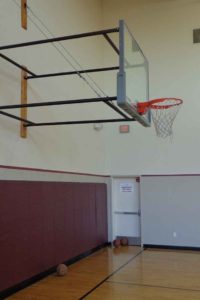 Afterwards, it would take hours and hours perfecting those fundamentals, and then learning how to use them in actual competition. This is the actual “development” – something that takes time, focus and commitment. When I look back on those years, I also realize that I was also developing on my own. In a game like basketball, if you want to play at the highest levels, you have to not only develop yourself personally, but you also have to figure out how to coalesce and build chemistry with the group of players you’re going to be playing with in competition.
Afterwards, it would take hours and hours perfecting those fundamentals, and then learning how to use them in actual competition. This is the actual “development” – something that takes time, focus and commitment. When I look back on those years, I also realize that I was also developing on my own. In a game like basketball, if you want to play at the highest levels, you have to not only develop yourself personally, but you also have to figure out how to coalesce and build chemistry with the group of players you’re going to be playing with in competition.
What I didn’t understand at the time was how to break out of my ‘comfort zone’. As you might imagine, the majority of the kids at the camp weren’t black, and as an inner-city kid I didn’t know how to blend with kids who didn’t look like me – befriending them and asking them to show me what they knew – also learning about their basketball and life experiences. Making new friends was encouraged, but I just didn’t know how to do it. This was also prior to the cell phones, social media, and the technology we have today, so I didn’t think to try to befriend and stay in contact with the other kids long-term.
Probably the last important principle I didn’t understand was that becoming a great basketball player involved combining the ‘organized’ and ‘street’ styles. The reason I played my best basketball at the camp was because I had become used to playing the ‘organized’ style. A teammate at Hutch-Tech likewise told me later that my game was ‘basic’, meaning that it was very technically sound and very ‘textbook’.
I thought he was picking on me as per usual, but he was right. It turned out that the great and transcendent players at any level could play within an organized team structure, but could also play off of pure instinct when necessary – creating shots for themselves or teammates, or creating key turnovers on defense – again all off of instinct. All of this takes any player time, effort and focus, and it should come from within the individual in order for it to truly bear fruit.
“Damn Anwar. You spent all of that money to go to basketball camp,” a classmate said to me as my junior year season fell apart due to injuries and grades. He was pitying me, and or gloating – I couldn’t tell which at the time. I wasn’t originally going to put this quote into this piece, but it’s a critical aspect of my book project because it underscores how peers view you when you’re setting out to do something of meaning and value. Some are happy for you, while some are waiting for you to fail.
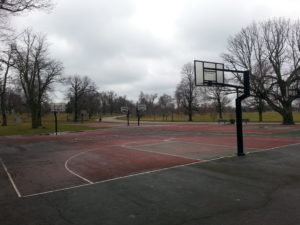 And again, not every family had the money to send their kids to camp which probably created some envy. Some kids wanted to play on the basketball team and didn’t for whatever reason. When you’re a player on a team, you don’t know how your classmates and peers are viewing you and your opportunities until you yourself are going through a hardship of some sort. This also underscores the importance of having the mental strength I discussed in part three of this series.
And again, not every family had the money to send their kids to camp which probably created some envy. Some kids wanted to play on the basketball team and didn’t for whatever reason. When you’re a player on a team, you don’t know how your classmates and peers are viewing you and your opportunities until you yourself are going through a hardship of some sort. This also underscores the importance of having the mental strength I discussed in part three of this series.
And I think I’ll wrap this up here. As I’m working on my book project, all of the things I didn’t know from that time are coming to me – things those in my own immediate familial ecosystem didn’t necessarily know to stress to me at the time – things which the highly successful players are and were taught at those critical stages of their development. This piece is thus highly valuable of young players in those stages. I have a cousin like that right now who thinks she wants to be a basketball player. This piece is very much for players like her who are good on defense for example, but need to develop their offensive games to go to that next level.
The following video is a look back Coach Jones, what he meant for my life and why he’s an important figure in my book project, “The Engineers: A Western New York Basketball Story”. If you watch the video, please give it a like and leave a comment.
Thank you for taking the time to read this blog post. If you enjoyed this post, you might also enjoy:
• Jason Rowe discusses Buffalo Traditional Basketball, the Yale Cup and State Tournaments
• Niagara Falls basketball legend Tim Winn discusses playing in the LaSalle basketball dynasty part one
• Niagara Falls basketball legend Carlos Bradberry discusses playing in the LaSalle basketball dynasty part one
• Niagara Falls coaching legend Pat Monti discusses building, and leading the LaSalle basketball dynasty part one
• Chris Herren discusses his journey, drug addiction, substance abuse and wellness
If you’ve found value here and think it will benefit others, please share it and or leave a comment. To receive all of the most up to date content from the Big Words Blog Site, subscribe using the subscription box in the right hand column in this post and throughout the site. Please visit my YouTube channel entitled Big Discussions76. Lastly follow me on the Big Words Blog Site Facebook page, on Twitter at @BWArePowerful, and on Instagram at @anwaryusef76. While my main areas of focus are Education, STEM and Financial Literacy, there are other blogs/sites I endorse which can be found on that particular page of my site.

Great story Dr. A., Ken Jones was our Audio Visual Teacher at West Hertle Middle School. I went to a Basketball Camp the Summer that I was going into the 8th grade. The camp was at St. Bonaventure College and your Uncle T drove me up there. I remember the trip quite well because T got a speeding ticket in Olean driving up there. He was not happy about that. But told me to have a great time when he dropped me off. MA & POPS somehow paid the camp fees and I’m still internally grateful..!!!
I roomed with that Athletic Director’s of St. Bonaventure son, Bobby Weise. We were a perfect match he was a point guard and I was the Legendary shooting guard from the rock ICEMAN. Our team made it to the semi-finals losing by 1 point. Bobby was also great tour guide for the campus and I met the SUPERSTAR Buffalo Bob Lanier, who showed us how to EXPLODE TO THE BASKET…!!
I’m surprised about your comments of now being able to mix with other kids that were not your nationality. You grew up partially in the Northwest Buffalo side of town and we had nothing but a melting pot of different nationalities there. Bobby was was white but played like a brother…lol.
After going to that camp I did mention it to Ken and he gave me flyer about his camp and I was on their mailing list. Although I never went to any other camps that one camp I went into enhanced my skills and help me throughout by High School and short College Career……And I had the time of my LIFE those 2 weeks up in Olean, NY….!!!
Good morning Ernest. Wow you never told me that you got to meet Bob Lanier. That’s awesome. For anyone who sees this, I want to clarify my comments about having trouble mixing with the other kids. I was friendly and social, but didn’t know to take that time get to know them better, learn some of their skill sets, and even learn about what it was like to go to their schools and then compare their experiences to my own. Some of the those kid’s schools actually went to the State Tournament in those years, and it would’ve been valuable to learn about the things that they were doing there. I’m learning that are large of being successful is actually being curious. I will say this though. Back at Hutch-Tech High School, while it was mixed, folks still hung out for the most part with one another along racial lines – so in some ways, no I wasn’t used to mixing.
The other part to this is that I had not at that point grown into my own person yet – how to be a leader. My best friend – and you know who my best friend is, attended the camp with me the first year and then his life went in a much different direction the last two years so I went out to the camp by myself afterwards. Unfortunately that affected me. That was my first time experiencing that sometimes you have to go your own way no matter what your friends are doing. Thanks again for weighing in.
Hello, Ken is my great Uncle and he recently passed. You’re post did a great job summarizing his positive attitude, love for basketball, and general zest for life. Thank you for writing this. I stumbled on this doing a quick google search for his obit and general curiosity about what is out there written about him.
Hello John. Thank you for reading my story about Coach Jones and for commenting. He made a huge difference in my life years after I stopped playing. He touched a lot of lives.
Loved reading your comments about Ken Jones. He nicknamed me “chicken winger” because my elbow stuck out when I shot the ball before I was strong enough to have a regular shot. I loved him and learned a lot from him over the years. I played HS ball at Pittsford Sutherland and now that I’ve had the opportunity to coach my son’s team at the YMCA and his grammar school, I think a lot about how Ken worked with everyone and really how great his lessons and energy were.
Thanks again, well done.
rs
Hey Robert. Thank you for stopping by and reading this. Yes Coach Jones taught me a lot about basketball and life. He was my first mentor. I’m in the process of finishing up my book project right now and I will be generating a few more pieces like this.
Rob,
I loved my time and experiences at Ken Jones’Camp as well!! The camp was at the now closed Eisenhower College. Ken was such a positive force and motivational person. The description of the camp being a “teaching” camp is spot on. I must say that your father ( Coach Sherer) was a fantastic, positive influence on me as a young man as well. Hope all is well with you and yours.
Greg Spinder
Hello Greg. Thank you for stopping by and sharing your experience about Coach Jones and his camp. I’ve started a second blog that I’m using to promote my book project. Check out the page I’ve created for The Engineers: A Western New York Basketball Story. Coach Jones is a central character in the book: https://bigwordsauthors.com/the-engineers-a-western-new-york-basketball-story/ .
I did attend Ken Jones Basketball camp. I am a female and was one of the very few that were there. Ken Jones was a friend of my father’s and my brother had gone to camp a few years before me. Rick Robey from the Boston Celtics made an appearance both years I attended the camp. I also attended the day camp in Rochester NY and Ken Jones was my driver to and from Buffalo every day. He was a great man and I feel very privileged to have met and spent time with him.
Hello Ellen. Thank you for leaving your comment. I was just going over my comments and saw this. Thank you for sharing. I did not know any females attended the camp. I’m in the process of finalizing my first book about playing for Coach Jones which involves attending his camp. If you want to learn some about the book, it’s at this link: https://bigwordsauthors.com/the-engineers-a-western-new-york-basketball-story/